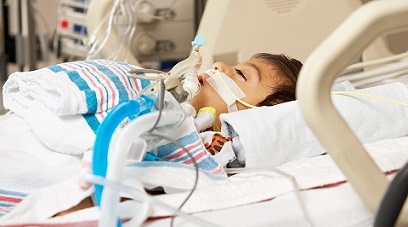BREAKING! German Study Published In Journal Claims Autoantibody Release In Children After COVID mRNA Vaccination Is A Risk Factor For MIS-C!
Source: Medical-News-Autoantobodies-Children Nov 22, 2021 3 years, 4 months, 3 weeks, 6 days, 23 hours, 38 minutes ago
German researchers and pediatric specialists from Caritas-Krankenhaus Bad Mergentheim Hospital-Germany and the Kinderkardiologie und Erwachsene Mit Angeborenen Herzfehlern Instutute-Germany have in a new study involving a case study reported that autoantibodies induced as result of COVID mRNA vaccines in children are a risk factor for Multisystem-Inflammatory Syndrome in Children (MIS-C).
 Stockshots
Stockshots
The study was published in the peer reviewed journal: Vaccines.
https://www.mdpi.com/2076-393X/9/11/1353
Multisystem inflammatory syndrome (MIS) is a new systemic inflammatory acute onset disease that mainly affects children (MIS-C) and, at a lesser frequency, adults (MIS-A); it typically occurs 3–6 weeks after acute SARS-CoV-2 infection and in some cases even after mild or even asymptomatic infections.
It has been postulated and shown in adults that MIS may occur after SARS-CoV-2 vaccination (MIS-V).
https://pubmed.ncbi.nlm.nih.gov/34034858/
https://pubmed.ncbi.nlm.nih.gov/34432976/
The study team report a case study involving multisystem inflammatory syndrome in an 18-year-old adolescent after the SARS-CoV-2 vaccine from Pfizer/BionTech (BNT162b2), who fulfills the published level 1 criteria for a definitive disease: age < 21 years, fever > 3 consecutive days, pericardial effusion, elevated CRP/NT-BNP/Troponin T/D-dimeres, cardiac involvement, and positive SARS-CoV-2 antibodies.
The disease starts 10 weeks after the second vaccination, with a fever (up to 40 °C) and was treated with amoxicillin for suspected pneumonia. The SARS CoV-2-PCR and several antigen tests were negative. With an ongoing fever, he was hospitalized 14 days later. A pericardial effusion (10 mm) was diagnosed by echocardiography. The C-reactive protein (174 mg/L), NT-BNP (280 pg/mL), and Troponin T (28 pg/mL) values were elevated. Due to highly elevated D-dimeres (>35,000 μg/L), a pulmonary embolism was excluded by thoracal computer tomography.
As the boy did not improve with intravenous antibiotics, he was treated with intravenous immunoglobulins; however, the therapy was discontinued after 230 mg/kg of dosage in which he developed high fever and hypotension.
A further specialized clinic treated him with colchicine and ibuprofen. The MIS-V was discovered late, 4 months after the onset of the disease.
As recently shown in four children with MIS-C after SARS-CoV-2 infection and a girl with Hashimoto thyroiditis after BNT162b2 vaccination, the study team found elevated functional autoantibodies against G-protein-coupled receptors that may be important for pathophysiology but are not conclusive for the diagnosis of MIS-C.
The study team notes that a misattribution of MIS-V as a severe complication of coronavirus vaccination can lead to increased vaccine hesitancy and blunt the global COVID-19 vaccination drive. However, the pediatric population is at a higher risk for MIS-C and a very low risk for COVID-19 mortality. The publication of such cases is very important to make doctors aware of this complication o
f the vaccination, so that therapy with intravenous immunoglobulins can be initiated at an early stage.
This is the second documented case involving adolescents developing Multisystem Inflammatory Syndrome due to induced autoantibodies as a result of COVID mRNA vaccines. The first was reported on the 2 August 2021 by the Danish Medicines Agency who investigated a case of inflammatory conditions, reported after COVID-19 vaccination, in a 17-year-old boy, after receiving COVID-19 vaccine from Pfizer/BionTech (BNT162b2) (Mainz, Germany). (
https://www.ema.europa.eu/en/news/meeting-highlights-pharmacovigilance-risk-assessment-committee-prac-30-august-2-september-2021
The present study also involved a second case study involving a 13 year old girl who also developed autoantibodies after a Pfizer-BioNTech BNT162b2 vaccination.
In order to prove their hypothesis of BNT162b2 vaccination-induced autoantibody release in children, the study team measured the autoantibody against G-protein-coupled receptors in a girl with Hashimoto thyroiditis after vaccination.
The study team found a uniform increase of all these autoantibodies after the first vaccination, which returned to baseline six weeks after the second vaccination, but thyroid peroxidase autoantibodies further increased. She had no clinical side effects, but pacemaker monitoring showed an impairment of her arrhythmia, known of since early childhood and currently successfully treated with the dual chamber pacemaker. Moreover, while TPO antibodies significantly increased after vaccination, the study team had to increase her thyroxin treatment to normalize the elevated TSH values.
With these cases, the study team attempts to connect knowledge about the potential of SARS-CoV-2 to trigger autoimmunity with known cardiovascular complications of the disease and vaccination.
https://pubmed.ncbi.nlm.nih.gov/33610751/
Autoinflammation may explain the impact of SARS-CoV-2 infections on Hashimoto thyroiditis, as well as arrhythmogenesis and myocarditis.
https://pubmed.ncbi.nlm.nih.gov/34462717/
https://www.jstage.jst.go.jp/article/circj/76/6/76_CJ-11-1374/_article/-char/ja/
https://www.fbscience.com/Elite/articles/pdf/Elite849.pdf
At least, it seems not to be the whole virus but the spike protein that induces autoimmunity, the most imminent danger for children in this pandemic.
Together with the published study data about elevated functional autoantibodies against G-protein-coupled receptors in children with MIS-C, the current case reports after vaccination show a comparable effect on the network of autoantibodies, and different autoantibodies uniformly shift to enhanced blood levels after the immunological response to the vaccine, comparable to our data after the natural infection. In both cases, the spike protein is the target of the immune response.
The study team told Thailand
Medical News, “Many countries are in the process of approving the vaccination for all children because the health policy goal of achieving herd immunity seems to only be achieved by immunizing the population as completely as possible. Although the complications of the vaccination are apparently rare, we may focus on the importance of management and therapy of these rare cases if we want to maintain public acceptance of the SARS-CoV-2 vaccination. We are aware that a misattribution of MIS-C as a severe complication of coronavirus vaccination can lead to increased vaccine hesitancy and blunt the global COVID-19 vaccination drive. However, the pediatric population is at a higher risk for MIS-C and a very low risk for COVID-19 mortality. At the currently high infection rate, the vaccination decision in childhood should be made dependent on the risk assessment of autoinflammatory diseases of COVID-19, compared with the vaccination.”
For the latest on
Autoantibodies and SARS-CoV-2 Spike Proteins, keep on logging to Thailand Medical News.
